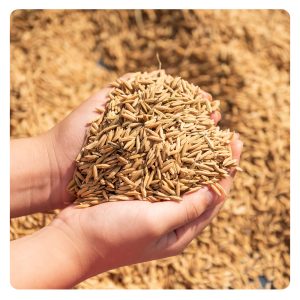
Grain-free feeding is a trend in the horse world, and many people think grains are bad for horses. But where does this thinking come from? The answer is quite simple: in the wild, horses primarily eat herbs and grass to meet their daily needs for energy and nutrients. However, it is important to remember that wild horses move much more moderately than domesticated horses used for working purposes. At that time, grain was added to their diet because of the significant amount of energy it provided, especially rapidly available energy, which was essential to perform their work.
Today, the energy requirements of most horses are significantly lower. Especially when it comes to recreational riding. For these horses, good roughage with the necessary vitamins and minerals is often sufficient. However, this does not mean that grain is harmful to horses. Grains contain valuable ingredients such as vitamins, minerals, high-quality fiber and, in the case of oats, also oil, polyphenols and beta-glucans. These ingredients offer numerous benefits for supporting intestinal health.
Grains are still an excellent source of energy for horses. Especially when your horse has an athletic performance to perform or when your horse needs to compensate for a lack of fitness. Quickly available energy in the form of carbohydrates allows the horse to provide energy for muscles, for example, without much effort in metabolism. So it can make sense to feed your horse grains. With horses, however, you must take into account the limited digestive capacity of carbohydrates. Research shows that 2 grams of carbohydrates per kg body weight per meal can be easily digested without causing problems.
Too many carbohydrates can lead to rapidly rising blood sugar levels. This can be a problem especially for insulin-resistant horses and can also promote metabolic diseases and laminitis in the long run. When excess carbohydrates are given that cannot be processed in the small intestine, they start to shift to the large intestine and interfere with the fermentation of fiber there.
Grain-free feeding certainly makes sense if your horse has metabolic disease and also if your horse is low activity and prone to obesity. In these cases, grain-free feeding can be a good option. But feeding grains in limited amounts is no problem at all for healthy horses. As always, it’s the dose that counts and it’s all about balance.
Author: Dr. Hilde Vrancken
Vet
Discount Applied Successfully!
Your savings have been added to the cart.